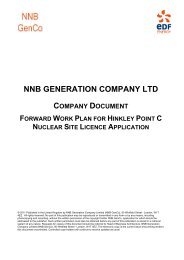PSA of Accidents in the Spent Fuel Pool - EDF Hinkley Point
PSA of Accidents in the Spent Fuel Pool - EDF Hinkley Point
PSA of Accidents in the Spent Fuel Pool - EDF Hinkley Point
Create successful ePaper yourself
Turn your PDF publications into a flip-book with our unique Google optimized e-Paper software.
HPC-NNBOSL-U0-000-RES-000034 Version 2.0<br />
<strong>PSA</strong> <strong>of</strong> <strong>Accidents</strong> <strong>in</strong> <strong>the</strong> <strong>Spent</strong> <strong>Fuel</strong> <strong>Pool</strong><br />
NOT PROTECTIVELY MARKED<br />
<br />
o Loss Of Cool<strong>in</strong>g Cha<strong>in</strong> (LOCC).<br />
Loss <strong>of</strong> PTR [FPCS] ma<strong>in</strong> tra<strong>in</strong>s caused by <strong>the</strong> loss <strong>of</strong> PTR [FPCS] pump or header<br />
(LFPCP and LHEADER).<br />
Loss <strong>of</strong> <strong>the</strong> two PTR [FPCS] ma<strong>in</strong> tra<strong>in</strong>s (L2FCP) caus<strong>in</strong>g <strong>the</strong> total loss <strong>of</strong> fuel pool<br />
cool<strong>in</strong>g, i.e. simultaneous unavailability <strong>of</strong> <strong>the</strong> two PTR [FPCS] ma<strong>in</strong> tra<strong>in</strong>s with a<br />
potential for los<strong>in</strong>g <strong>the</strong> third tra<strong>in</strong>.<br />
<br />
<strong>Spent</strong> <strong>Fuel</strong> <strong>Pool</strong> empty<strong>in</strong>g (fast level drop).<br />
Follow<strong>in</strong>g such events, <strong>the</strong> follow<strong>in</strong>g consequences <strong>in</strong> <strong>the</strong> fuel build<strong>in</strong>g can arise:<br />
Saturation conditions <strong>in</strong> <strong>the</strong> pool <strong>in</strong> <strong>the</strong> event <strong>of</strong> <strong>the</strong> total loss <strong>of</strong> <strong>the</strong> PTR [FPCS]<br />
(boil<strong>in</strong>g),<br />
<br />
Degradation <strong>of</strong> <strong>the</strong> fuel assemblies <strong>in</strong> <strong>the</strong> pool follow<strong>in</strong>g boil<strong>in</strong>g <strong>of</strong> water <strong>in</strong> <strong>the</strong> <strong>Spent</strong><br />
<strong>Fuel</strong> <strong>Pool</strong> (fuel damage).<br />
Sub-chapter 15.3 - Table 1 gives <strong>the</strong> frequency per year <strong>of</strong> <strong>the</strong> <strong>in</strong>itiat<strong>in</strong>g events<br />
studied for <strong>the</strong> Non Dra<strong>in</strong><strong>in</strong>g Events. All reactor states are covered. The reactor states<br />
are described <strong>in</strong> sub-section 3.1.1 <strong>of</strong> this sub-chapter. Compared to <strong>the</strong> UK EPR GDA TM<br />
step 4 <strong>PSA</strong> model, <strong>the</strong> frequencies <strong>of</strong> long LOOP <strong>in</strong>itiat<strong>in</strong>g events <strong>in</strong> <strong>Spent</strong> <strong>Fuel</strong> <strong>Pool</strong><br />
<strong>PSA</strong> have changed and come from [Ref. 8]. Indeed, long LOOP frequencies for <strong>the</strong><br />
H<strong>in</strong>kley Po<strong>in</strong>t site are derived from British operat<strong>in</strong>g experience [Ref. 11]. Note that <strong>the</strong><br />
frequency <strong>of</strong> long LOOP <strong>in</strong>itiat<strong>in</strong>g event <strong>in</strong> <strong>Spent</strong> <strong>Fuel</strong> <strong>Pool</strong> <strong>PSA</strong> <strong>in</strong> <strong>the</strong> at-power state<br />
<strong>in</strong>cludes <strong>the</strong> contribution <strong>of</strong> long LOOP consequential to Reactor Trip.<br />
Sub-chapter 15.3 - Table 2 gives <strong>the</strong> frequency per year <strong>of</strong> <strong>the</strong> <strong>in</strong>itiat<strong>in</strong>g events<br />
studied for <strong>the</strong> Dra<strong>in</strong><strong>in</strong>g Events [Ref. 4]. All reactor states are covered. The reactor<br />
states are described <strong>in</strong> sub-section 3.1.2 <strong>of</strong> this sub-chapter.<br />
At power or dur<strong>in</strong>g shutdown with <strong>the</strong> core <strong>in</strong> <strong>the</strong> vessel, <strong>the</strong> frequency <strong>of</strong> Initiat<strong>in</strong>g<br />
Events affect<strong>in</strong>g <strong>the</strong> <strong>Fuel</strong> <strong>Pool</strong> Cool<strong>in</strong>g System is { CCI removed } a :<br />
The dom<strong>in</strong>ant <strong>in</strong>itiat<strong>in</strong>g event is <strong>the</strong> loss <strong>of</strong> a PTR [FPCS] pump (48%).<br />
<br />
97% <strong>of</strong> <strong>the</strong> risk <strong>of</strong> los<strong>in</strong>g <strong>the</strong> PTR [FPCS] occurs dur<strong>in</strong>g at-power states.<br />
Dur<strong>in</strong>g refuell<strong>in</strong>g, <strong>the</strong> frequency <strong>of</strong> loss <strong>of</strong> <strong>the</strong> PTR [FPCS] is evaluated as<br />
{ CCI removed } a :<br />
The dom<strong>in</strong>ant <strong>in</strong>itiat<strong>in</strong>g event is <strong>the</strong> loss <strong>of</strong> both PTR [FPCS] operat<strong>in</strong>g tra<strong>in</strong>s<br />
follow<strong>in</strong>g <strong>the</strong> loss <strong>of</strong> <strong>the</strong> RRI [CCWS]/SEC [ESWS] cool<strong>in</strong>g system (60%).<br />
<br />
The second ma<strong>in</strong> cause <strong>of</strong> <strong>the</strong> loss <strong>of</strong> <strong>the</strong> ma<strong>in</strong> PTR [FPCS] tra<strong>in</strong>s is <strong>the</strong> failure <strong>of</strong> <strong>the</strong><br />
pumps <strong>in</strong> operation (32%).<br />
2.4 External Event: Loss <strong>of</strong> Ultimate Heat S<strong>in</strong>k<br />
In <strong>the</strong> GDA step 4 UK EPR <strong>PSA</strong>, <strong>the</strong> Loss Of Ultimate Heat S<strong>in</strong>k (LUHS) <strong>in</strong>itiat<strong>in</strong>g<br />
events were not modelled for <strong>the</strong> <strong>Spent</strong> <strong>Fuel</strong> <strong>Pool</strong>, based on an argument that <strong>the</strong><br />
correspond<strong>in</strong>g fuel damage frequency would be very low.<br />
In <strong>the</strong> HPC <strong>PSA</strong> model, new event trees have been added to model <strong>the</strong> transient<br />
follow<strong>in</strong>g Loss Of Ultimate Heat S<strong>in</strong>k event. As for an accident <strong>in</strong> <strong>the</strong> Reactor Build<strong>in</strong>g<br />
(cf. PCSR Sub-chapter 15.2, [Ref. 15]), <strong>the</strong> <strong>in</strong>itiat<strong>in</strong>g event Loss Of Ultimate Heat S<strong>in</strong>k is<br />
modelled as a fault tree. Massive <strong>in</strong>gress <strong>of</strong> mar<strong>in</strong>e organisms is <strong>the</strong> only hazard that<br />
has been modelled for LUHS <strong>in</strong>itiat<strong>in</strong>g event. It is assumed that o<strong>the</strong>r hazards that could<br />
UNCONTROLLED WHEN PRINTED<br />
NOT PROTECTIVELY MARKED<br />
Page 8 <strong>of</strong> 37



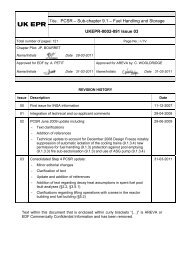
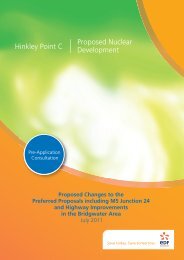
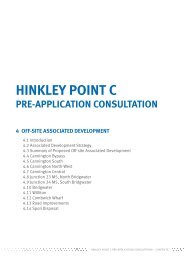
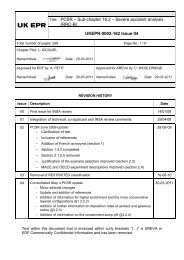
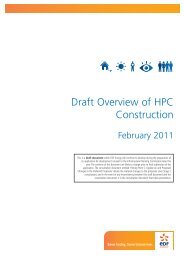

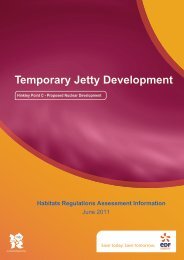
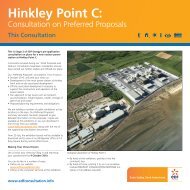
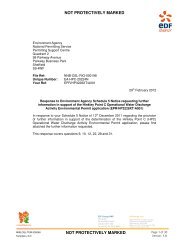
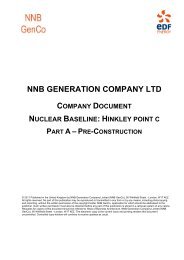
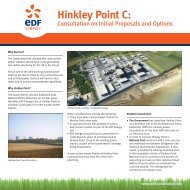
![6.3 - Safety Injection System (RIS [SIS]) - EDF Hinkley Point](https://img.yumpu.com/42739985/1/184x260/63-safety-injection-system-ris-sis-edf-hinkley-point.jpg?quality=85)
